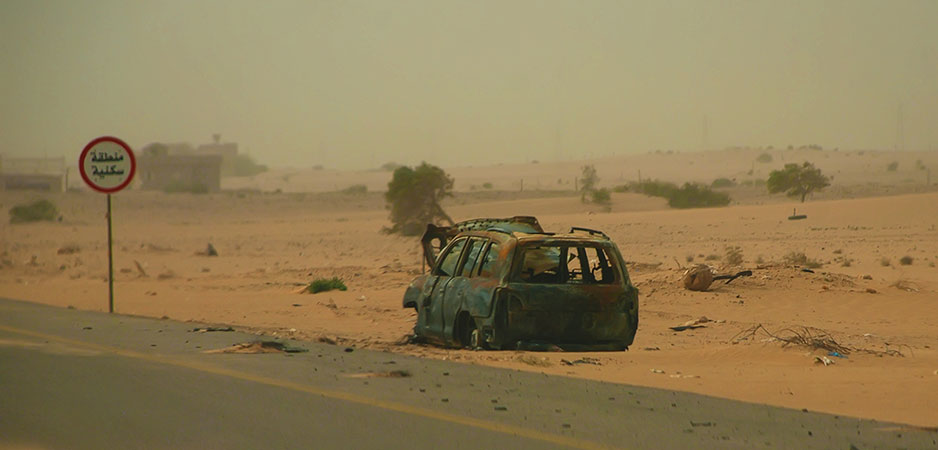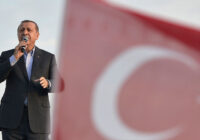Success has many fathers, failure is an orphan, the wise ones say. I would add that failure suddenly gets you dumped like a hot potato in the hands of your benefactors. You don’t believe me? Just ask the Libyan has-been, Khalifa Haftar, at one time considered the best game in town by his foreign backers. The general knows a thing or two about hot potatoes.
French President Emmanuel Macron has no qualms about claiming that France never supported Haftar. In the era of television and coronavirus social distancing, Macron was saved the embarrassment of looking us in the eye as he insulted our intelligence. Or perhaps he wasn’t. Unlike many of us, but still with a good memory, he was just too young to remember the French military helicopter shot down near Benghazi, killing three French soldiers in July 2016. Clearly, they were not there paying a social visit to Haftar, and not in a war chopper.
Deeper Fragmentation Looms for Libya
Nor would he remember the Javelin missiles discovered in the possession of Haftar’s forces that France procured from the Americans, probably using cash it withdrew from one of the two petrodollar ATMs. But to be fair to France, it did confess ownership of those missiles, explaining, “Those missiles were damaged! Awaiting destruction!” In Haftar’s possession, we may ask? Seriously?
Granted, torpedoing a political process intended to bring an accountable transparent rule of law is anathema to Haftar’s regional supporters and for Russian President Vladimir Putin too, who, like his colleagues in Cairo, Riyadh and Abu Dhabi has fixed himself with job security until 2036 or eternity, whichever lasts longer. Installing another North African military junta makes sense — for them at least.
Ultimate Objective
But what could possibly drive France to be involved in a destructive war with the ultimate objective to restore a brutal military dictatorship, which goes against everything the French people stand for? Moreover, France’s role in Libya has split the NATO alliance dangerously. French and Turkish warships recently faced each other as adversaries rather than allies in the Mediterranean Sea. Rather than work with a NATO partner who knows the dangers of, and has freed itself from, military rule, Turkey, Macron, in order to help bring a civilian-led political process in Libya, has taken the side of the region’s most ruthless dictatorships, Egypt, the UAE and Saudi Arabia, and also Russia, who must be applauding the NATO split.
By what measure of expression and democratic representation of the people does Macron’s policy reflect the will of the French majority? Probably the answer to that and other debacles of the Macron administration might come soon. The next election is in 2022, and the French do not suffer fools.
Still insulting our intelligence, France insists it is engaged in fighting terrorism — everybody’s cause célèbre for rampage, plunder, death and destruction. From Afghanistan to Iraq and Yemen, to Libya and Syria, one wonders who has become more dangerous, more destructive, more criminal — the terrorists or those claiming to be fighting and saving us from them?
The Soviet occupation of Afghanistan saw the creation of al-Qaeda by the CIA, which funded, trained and armed the group — complete with stinger missiles. Immediately after the Soviets left Afghanistan and America won that Cold War battlefield, the Afghans were dumped, only to be remembered when America itself decided to invade the country. Only this time, it is the Russians who are hitting back at the US there, if the reports on bounty money for dead Americans are to be believed.
Even before the blood of Afghans and Americans dried up, Washington decided to launch another invasion, this time against weapons of mass destruction, or maybe to bring democracy, or maybe leading an anti-terrorism alliance. It took the maestro himself, Alan Greenspan, to admit what we already knew. In his book, “The Age of Turbulence,” Greenspan writes that “The Iraq war was largely about oil.” He goes on to say, “I am saddened that it is politically inconvenient to admit what everybody knows.” There, so much for WMDs and fighting terrorism and bringing democracy on the backs of war tanks.
Western Playbook
There is a playbook in the West, used in every modern-day invasion of the Middle East. In it, loud noises are never the not-so-hidden agendas. Pardon me for stating the obvious. The problem with that short-sighted destructive playbook is its unnecessary cost in blood and treasure.
In 2012, at the height of the Arab Spring and our optimism, I attended a conference in Istanbul discussing “rebalancing.” Advocating for the idea of rebalancing Arab-Western relations, I said that “while we Arabs must refuse to be held hostage by the past, and we will continue to advocate a forward looking new page in our relations. The West must also free itself from its past.” The West tragically was unable to live with the prospects of new realities emerging in the Arab world and went ahead to help cut the knees of the democratic forces.
Our argument for creating governments that do not rely on foreign powers for protection but on their own electorates to whom they will also be answerable was exactly what was feared. When I said, “The West must realize that the incoming governments of Arabia, unlike the outgoing dictatorships, will be answerable to their people, and therefore have less wiggle room to make decisions that only serve short term external interests over their people’s long-term interests,” a Western friend came to me and said, “That’s exactly why your revolution will not be allowed to succeed.”
That kind of shift in the West toward the Middle East would require accepting representative governments created through a transparent, accountable political process and accepting economic exchange based on fair value. An exchange we have always been happy to engage in, no bloody and expensive invasions needed. After all, the Arab world can neither drink its oil nor live in economic isolation.
But the West has never been used to that type of relationship with us. Not when it was the colonial power nor later, as the protector of proxy regimes it helped create at the end of its colonial presence. That inability to accept a change in the region lies at the center of its policies — supporting the survival of military and other undemocratic regimes in the region whose existence is not protected by the mandate of the people they govern but by foreign powers. The price for that quid pro quo is paid economically and politically and is never at fair value for the people who matter — the growing populations.
The vicious cycle is perpetuated. The more such arrangements are created at the top, the more unrest is created at the base against the ruling tyrants, which in turn leads to more dependence on foreign protection. Imagining the violent outcome is a no brainer, and it is clear before our very eyes.
Whether it is America and Britain in Afghanistan and Iraq, or France in Libya and elsewhere in Africa, that playbook has become more costly not just for the people in whose territories it is played out, but also in the streets of the nations that employ it. Tyranny comes in different shapes and forms. It is also dressed differently, and not just in turbans and military uniforms. Perhaps the worst is the one that comes deceptively in a suit and necktie, controlling the levers that drive the others.
*[This article was originally published by the Daily Sabah.]
The views expressed in this article are the author’s own and do not necessarily reflect Fair Observer’s editorial policy.
Support Fair Observer
We rely on your support for our independence, diversity and quality.
For more than 10 years, Fair Observer has been free, fair and independent. No billionaire owns us, no advertisers control us. We are a reader-supported nonprofit. Unlike many other publications, we keep our content free for readers regardless of where they live or whether they can afford to pay. We have no paywalls and no ads.
In the post-truth era of fake news, echo chambers and filter bubbles, we publish a plurality of perspectives from around the world. Anyone can publish with us, but everyone goes through a rigorous editorial process. So, you get fact-checked, well-reasoned content instead of noise.
We publish 2,500+ voices from 90+ countries. We also conduct education and training programs
on subjects ranging from digital media and journalism to writing and critical thinking. This
doesn’t come cheap. Servers, editors, trainers and web developers cost
money.
Please consider supporting us on a regular basis as a recurring donor or a
sustaining member.
Will you support FO’s journalism?
We rely on your support for our independence, diversity and quality.






